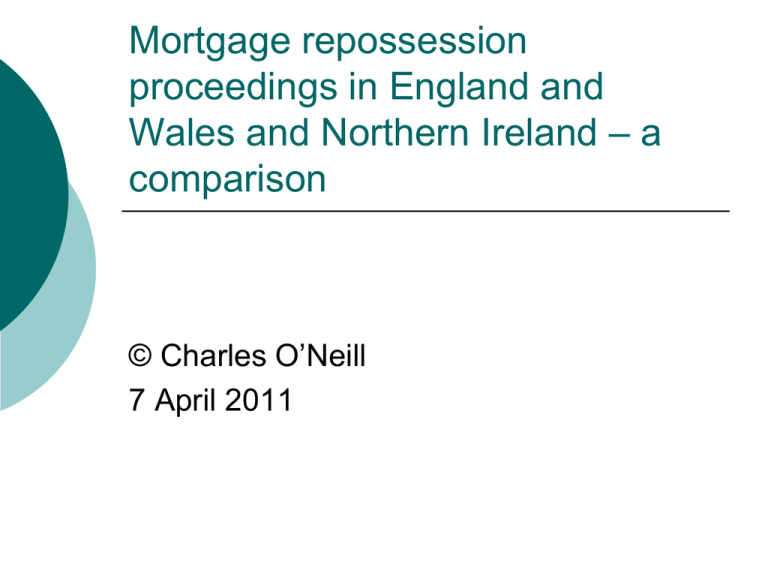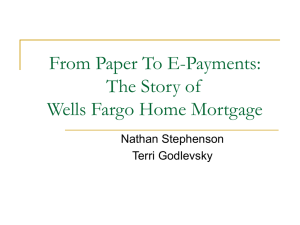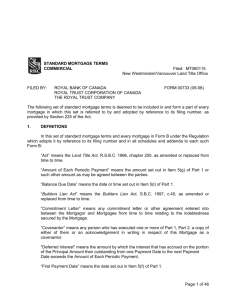Mortgage repossession proceedings in England and Wales and
advertisement

Mortgage repossession proceedings in England and Wales and Northern Ireland – a comparison © Charles O’Neill 7 April 2011 Aim of the presentation This presentation will consider the themes in common in mortgage repossession proceedings in England and Wales and Northern Ireland and will examine the differences in the case law in the different jurisdictions in this important area of law. Similar provisions in England and Wales and Northern Ireland There is a Pre-action protocol in each jurisdiction Mortgages are subject to the same regulatory framework by the Financial Services Authority Same legislation applies in the form of Administration of Justice Acts 1970 and 1973 Consumer Credit Act 1974 (as amended) Pre-action protocols Pre-action protocol for possession claims based on mortgage or home purchase plan arrears in respect of residential property – introduced in England and Wales on 18 November 2008 Pre-action protocol for possession proceedings based on mortgage arrears in respect of residential property – introduced in Northern Ireland on 5 October 2009. Compliance with Pre-action Protocol In England and Wales since October 2009 a lender has to confirm how it has complied with the protocol (Form N123). No such requirement in Northern Ireland although there is a possibility of a sanction in cost terms. Regulation by the FSA Regulation of mortgages Regulation of lifetime mortgages and home reversion plans Regulation of sale and rent back agreements Procedural differences England and Wales Usual forum is County Court Use Civil Procedure Rules Part 55 Enforcement through a bailiff system Northern Ireland Forum is the High Court in Belfast Use Order 88 of the Rules of the Court of Judicature 1981 (as amended) Enforcement through the Enforcement of Judgments Office Differences in case law However there are interesting differences in the jurisdiction of the court in relation to applications for possession of a dwelling-house and in particular in the case law involved in the interpretation of the Administration of Justice Acts 1970 and 1973. Differences There have been different approaches of the courts in England and Wales to those in Northern Ireland in relation to proposals to the discharge of arrears over a period of time and to sell the property to discharge the mortgage The same legislation applies in England and Wales and Northern Ireland Administration of Justice Act 1970 Section 36 Administration of Justice Act 1973 Section 8 Section 36 of the Administration of Justice Act 1970 “(1)Where the mortgagee under a mortgage of land which consists of or includes a dwelling-house brings an action in which he claims possession of the mortgaged property, not being an action for foreclosure in which a claim for possession of the mortgaged property is also being made, the court may exercise any of the powers conferred on it by subsection (2) below if it appears to the court that in the event of its exercising the power the mortgagor is likely to be able within a reasonable period to pay any sums due under the mortgage or to remedy a default consisting of a breach of any other obligation arising under or by virtue of the mortgage.” overleaf Section 36 of the Administration of Justice Act 1970 continued (2) The court – (a) May adjourn the proceedings; or (b) On giving judgment, or making an order, for delivery of possession of the mortgaged property, or at any time before the execution of such judgment or order, may (i) Stay or suspend execution of the judgment or order, or (ii) Postpone the date for delivery of possession for such period or periods as the court thinks fit. Administration of Justice Act 1973 “8(1) Where by a mortgage of land which consists of or includes a dwelling-house, or by an agreement between the mortgagee under such a mortgage and the mortgagor, the mortgagor is entitled or is to be permitted to pay the principal sum secured by instalments or otherwise to defer payment of it in whole or in part, but provision is made for earlier payment in the event of any default by the mortgagor or of a demand by the mortgagee or otherwise, then for the purposes of section 36 of the Administration of Justice Act 1970 (under which a court has power to delay giving a mortgagee possession of the mortgaged property so as to allow the mortgagor a reasonable time to pay any sums due under the mortgage) a court may treat as due under the mortgage on account of the principal sum secured and of interest on it only such amounts as the mortgagor would have been expected to be required to pay if there had been no such provision for earlier repayment. Administration of Justice Act 1973 8(2) A court shall not exercise by virtue of subsection (1) above the powers conferred by section 36 of the Administration of Justice Act 1970 unless it appears to the court that the mortgagor is likely to be able to pay any amounts regarded (in accordance with subsection (1) above) as due on account of the principal sum secured, but also that he is likely to be able by the end of the period to pay any further amounts that he would have expected to be required to pay by then on account of that sum and of interest on it had there been no such provision as is referred to in subsection (1) above for earlier payment.” Proposals to discharge the arrears over a period of time Often borrowers in mortgage arrears make proposals to the court to discharge the arrears over a period of time The question to be considered by the court is how to exercise its discretion “if it appears to the court that in the event of its exercising the power the mortgagor is likely to be able within a reasonable period to pay any sums due under the mortgage or to remedy a default consisting of a breach of any other obligation arising under or by virtue of the mortgage” Section 36(1) of the Administration of Justice Act 1970 The position before Cheltenham & Gloucester Building Society v Norgan [1996] 1 All ER 449. Prior to Norgan, the practice in the English courts was to consider a period of two years as a reasonable period. In the Northern Irish courts it was recognised that a reasonable period was regarded as normally being a relatively limited period with an outer limit of around four to five years. However this kind of approach was changed fundamentally with the decision of Norgan in England and Wales In Norgan the court said that the following had to be considered 1. 2. 3. 4. 5. 6. 7. 8. How much can the borrower reasonably afford to pay, both now and in the future? If the borrower has a temporary difficulty in meeting his obligations, how long is the difficulty likely to last? What was the reason for the arrears which have accumulated? How much remained of the original term? What are the relevant contractual terms, and what type of mortgage is it, when is the principal due to be repaid? Is it a case where the Court should exercise its power to disregard accelerated payment provisions (section 8 of the 1973 Act)? Is it reasonable to expect the lender, in the circumstances of the particular case to recoup the arrears of interest (1) over the whole of the original term, or (2) within a shorter period, or even, (3) within a longer period ie by extending the repayment period? Is it reasonable to expect the lender to capitalise the interest, or not? Are there any reasons affecting security which should influence the length of the period for payment? Norgan The court stated that in establishing the reasonable period the court should take as its starting point the balance of the term of the mortgage and ask could the borrowers pay the arrears over that period Northern Ireland In Northern Ireland the opportunity to consider the decision in Norgan came in National and Provincial Building Society v Lynd [1996] NI 47 – a decision of the Northern Ireland High Court Lynd On appeal, in Lynd, Girvan J considered that if the Court of Appeal in Norgan held that the life of the mortgage may be a relevant factor then he agreed with it. In so far as it required the court to start out with the strong presumption that the remainder of the term represented the reasonable period he disagreed with it. In essence the judge respectfully submitted that to look at the term of the mortgage was the wrong starting point. He considered that “a determination of the facts set out by Evans J [in Norgan] without any pre-disposition for or against the relevant period being the balance of the term of the mortgage is in my respectful view the proper approach”. He also considered that Norgan could be distinguished from Lynd in that in the latter case the mortgage debt was close to or exceeded the value of the property whereas in Norgan it was clear that the value of the property was such that the plaintiff’s security was in no way at risk. Lynd Girvan J (as he then was) stated “A defaulting mortgagor who could reasonably pay off arrears at £200.00 per month cannot be heard to argue that he should be allowed to pay them off at £100.00 per month because it would suit him to have a longer time frame. By first focusing on how much the mortgagor can afford to pay the Court will then arrive at the period it will take to discharge the arrears at that rate. It can then ask itself the question whether in all the circumstances of the case, taking into account the factors set out by Evans LJ, it is reasonable to allow the mortgagor the length of time needed to discharge the arrears at the proposed rate.” Comparison – Norgan and Lynd Lynd represents a situation where the borrower’s capacity to pay is addressed first to establish his or her best realistic proposal then look at the period over which the arrears will be addressed Represents a fairer balance to the lender and the borrower Not preclude another chance for the borrower if there is a further default FSA MCOB “The FSA takes the view that the determination of a reasonable payment period will depend upon the individual cirumstances. In appropriate cases this will mean that repayments are arranged over the remaining term of the regulated mortgage contract.” MCOB 13.3.6 Proposals to sell the mortgaged property Another proposal frequently put before the court at a mortgage repossession hearing is that the borrower intends to sell the property. What should the attitude of the court be to such a proposal? Proposals to discharge debt by selling the property If the borrower intends to sell the mortgaged property it is crucial that he will be in a position to discharge all sums secured on the mortgage and indeed any other loans secured on it. It is not just an issue of discharging the arrears. Royal Trust of Canada v Markham [1975] 3 All ER 433. The lender often is anxious to ensure that the borrowers undertake all reasonable measures to market and sell the property as soon as possible as there is a danger that the borrowers will prevaricate in the sale as they are still in possession of the property. Furthermore, if the borrowers are not in a position to make even the monthly instalments due on the mortgage account never mind any contribution to the arrears, the level of the arrears on the account will increase during the period of adjournment or stay of enforcement. National and Provincial Building Society v Lloyd Neill LJ indicated that if there was clear evidence that a completion of a sale of a property, perhaps by piecemeal disposal, could take place in six or nine months or even a year then he could see no reason why a court could not come to the conclusion that the borrower was likely to be able within a reasonable period to pay any sums due under the mortgage. The question as to what is a reasonable time is a matter for the court in each individual case. [1996] All ER 630. Bristol and West Building Society v Ellis In Bristol and West Building Society v Ellis Auld LJ put forward three propositions: where the property is already on the market and there is some indication of delay on the part of the borrower a short period of suspension of only a few months would be reasonable where there is likely to be considerable delay in selling the property and/or its value is close to the total of the mortgage debt so as to risk the adequacy of the security, immediate possession or a short period of suspension might be reasonable where there has already been considerable delay in realising a sale of the property and/or the likely sale proceeds are unlikely to cover the mortgage debt and arrears or there is no sufficient evidence as to sale value, the normal order would be for immediate possession. (1997) 2 HLR 282. Cheltenham and Gloucester Building Society v Krausz This is authority for the proposition that the court can only adjourn or suspend an order for possession to facilitate a sale of the property by the borrower if the court is satisfied that the proceeds of sale will be sufficient to discharge the entirety of the mortgage debt. In other words the court cannot do this if there is negative equity. However the court must look at all the circumstances of the case. Certainly if the only security afforded to the lender was the property to be sold and there is a negative equity the court has no power to adjourn or suspend However the question will be different if the lender has other security or if the borrower has the means to add to the proceeds of sale, perhaps from the sale of another property which is not mortgaged. [1997] 1 All ER 21. Barclays Bank plc v Alcorn Even if the borrower indicated to the court that he intended to sell part of the security to discharge the arrears (by selling a building site for instance) the practice of the court would be to exercise the discretion over all the mortgaged property and not part of it. To interpret the legislation otherwise would be to place too strenuous an interpretation of the discretion under the legislation. [2002] All ER (D) 146 Judicial comment in Northern Ireland In Northern Bank Limited v Mallett, on appeal Girvan J considered that the evidence which a borrower should produce when seeking an adjournment or stay on an order for possession pending sale by the borrower is a letter from a reputable estate agent acting in the sale stating: that the property is on the market for sale what is the asking price is the asking price realistic in the light of comparable prices in the area comment on the perceived ease or difficulty in the sale of the property whether offers have been received likely timescale of the sale [2001] NIJB 225 Northern Bank Limited v Jeffers In the Northern Ireland High Court Girvan J stated: “Where there is a genuine proposal by a mortgagor to sell the mortgaged property at arm’s length in the open market, a mortgagee would normally be ill-advised to object to a short time being granted to enable such a sale to be effected by the mortgagors since such a sale is likely to enhance the sale value of the property which is normally depreciated by the circumstance of a forced sale. When a mortgagor makes an application for a stay in such circumstances the court must exercise its discretion under s 36 [of the Administration of Justice Act 1970] and the fact that the order for possession was previously made with or without a stay does not preclude the court acceding to the application. The court will have to take into account all the relevant circumstances which may include the court’s view as to the genuineness of the proposal to sell, the steps taken to enable the sale to be effected, the likely value of the property if sold by the mortgagors as compared to the value if sold by the mortgagee, the conduct by the mortgagor in the past, at the time of the making of the order and since the making of the order and the increase or decrease of the mortgage debt since the making of the order.” [1996] NI 497 Conclusion While there are some similarities in the approach to mortgage repossession proceedings in Northern Ireland compared to that in England and Wales there are some important differences as to what the court should take into account when it receives proposals to discharge arrears over time or to sell the mortgaged property. Note Please note that the material in this paper is given as general guidance only. The law in this area is subject to change, sometimes at very short notice. Therefore before giving any advice to clients to take a particular course of action or not to take a particular course of action the exact current legal position should be investigated and confirmed. Charles O’Neill Published work The Law of Mortgages in Northern Ireland by SLS Legal Publications (NI) 50 Lansdowne House, 50 Malone Road, Belfast, BT9 5BS, 2008 The Law of Private Tenancies in Northern Ireland (pending)









